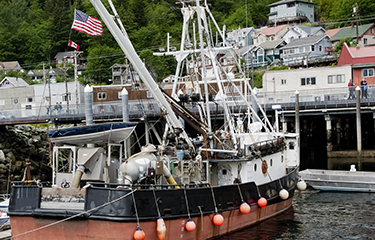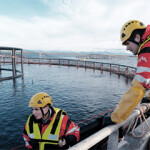Alaskan fishing communities ask for seat at climate policy table

Alaskan fishing organizations are urging the administration of U.S. President Joe Biden to listen to coastal communities and fishermen while crafting an ecosystem-based approach to climate change and fisheries policy.
The message from Alaska fishing communities came through recent public comments hearing by the National Oceanic and Atmospheric Administration (NOAA) on the new administration’s executive order on climate change.
Alexus Kwachka, a commercial fisherman based in Kodiak, Alaska, said the threat climate change poses to commercial fishing is clear to those working on the water in Alaska, where warming sea temperatures and a lack of ice in the Bering Sea have prompted unprecedented fluctuations in fish stocks and species distribution.
“As an Alaska fisherman, I can tell you first hand that climate change has put America’s access to healthy, sustainable wild seafood at stake – and with it, thousands of fishing jobs, businesses, and communities dependent on access to wild seafood,” Kwachka said.
Like many fishermen, Kwachka was hopeful the Biden administration will enact proactive climate policy, but said the knowledge of coastal communities and those at sea must be taken into account.
“I applaud the Biden administration for acknowledging this existential threat to Alaska’s fishing industry and urge NOAA and NMFS to act swiftly to help fisheries and fishing communities to adapt and survive in this changing world. Whatever tools and policies are developed must be crafted by those who rely most on the marine and freshwater ecosystem, including commercial fishermen,” Kwachka said.
Linda Behnken, a commercial fisherman and director of the Alaska Longline Fisherman’s Association, urged Biden to enact protections to protect against large-scale mining and logging in critical habitats, like the Tongass National Forest, which the Trump administration moved to open to logging.
“Broad coalitions of fishermen, NGOs, tribes, and fishing communities have been asking for protection of critical fish habitat for decades in the Bristol Bay watershed, as well as the Tongass National Forest. Protecting these areas is a clear and meaningful first step for the Biden administration to make Alaska's fishing industry and fishery dependent communities more resilient and able to adapt to climate change," Behnken said.
While proper fisheries management in Alaska can help sustain Alaska’s wild fish runs, Behnken said Biden needs work to aggressively reduce greenhouse gas emissions on a global scale to ensure global ecosystems aren't inexorably disturbed.
"Fishermen should be at the helm of ocean-based climate strategies, but changes to fisheries management cannot stop climate change. We are counting on the Biden administration to also reduce greenhouse gas emissions to stop climate change,” Behnken said.
According to a press release from Behnken’s Alaska Longline Fisherman’s Association, Alaska’s seafood industry generates USD 12.8 billion (EUR 10.8 billion), providing around 37,700 jobs and USD 2.1 billion (EUR 1.8 billion) in labor income every year.
Photo courtesy of dani3315/Shutterstock






Share